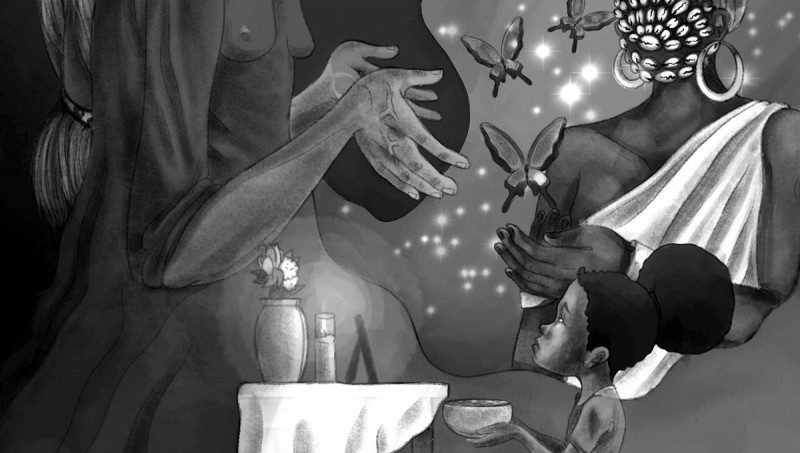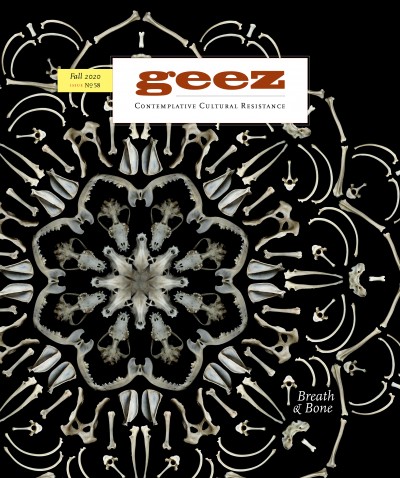Healing, Reverence, Justice

Credit: Shambe Badila, "Pray," 2020, Digital Art
Before the Once Upon a Time, there was A Long Long Time ago and other Actions that made the Once Upon even possible. After The End, some more things happened. Many of those are stories as well as journeys.
Let’s step off!
Those of you who are firmly wedded to the dogma of “modern science” may want to skip by this article. Click somewhere else! It may seem to some of you as the ramblings of someone who is out of touch with (your version of) reality.
1.
I used to work at the University of Michigan. Fifteen years ago, I participated in a reflection activity with my co-workers that has stayed with me. Thirty-six of us were asked to choose the social identity that had contributed the most to our being here “in this work.” I remember that I was the only Afrikan who did not stand at the table for “Race & Ethnicity.”
I stood at the table for “Religion” but demanded that we change our group’s designation officially to “Religion/Spirituality.” My co-workers assented.
I have been dealing with kidney failure from a young age. As a teenager, my father introduced me to holistic healing. More than the Baptist church I had been attending weekly, this brought me on a journey towards spiritual journeys and spiritual realities. The concept that we each have within us a reality that is undamaged, untraumatized, whole, and sacred resonated with me. It is from connecting to this place that all healing takes place.
I work towards realizing unaltered oneness on Earth.
Though I now cringe when asked about “my work,” even then, my “work” came from my spiritual vocation and experiences with spiritual and energetic injustices; a.k.a. living in this Matrix of trauma we (sarcastically) call a society.
How can my work on this planet help to bring about the experience of this unbroken spiritual reality to our daily waking lives? Why recreate systems and environments that traumatize and re-traumatize? What must be transformed so our spiritual experiences are not only when we sit quietly with our eyes closed but as we walk, talk, live, and love? In the Orisha spiritual mindset I would join a decade later, we call this “bringing heaven to earth and bringing earth to heaven.”
2.
We are not the only ones who say that death is not an ending but merely a transformation.
Unlike many spiritual and New Age belief systems that correlate physical illness solely to one’s nutritional intake and mental beliefs, The Orisha tradition recognizes that one’s body has been inherited from one’s ancestors. We literally are the living legacies of our Ancestors. We are embodied ancestors. We are the materialization of what they did and the work they have left unfinished.
My mother Linda passed when I was 16 years old; my younger brother Lee took his own life when I was 20. For decades I sought a religious expression that would help me to maintain relationships with them as well as to process my experiences of loss. I was pleasantly surprised to find this in the Orisha mindset. Furthermore, this ancient culture has introduced me to tools that help bring healing to my ancestors’ souls and add peace to the emotional/spiritual troubles they carried as they walk the earth.
When intimate friends ask how I’m doing during the pandemic, I tell them I’m in “spiritual school.” Part of this education includes spending time at my ancestral altar intentionally being welcomed by the lineages of each of four grandparents.
Set aside a clean space. Cover the surface with a white cloth. Enter the space with a spirit of reverence and appreciation. Burn a white candle. Know that your life was made possible, was handed to you by others- those named and (to you) unnamed. Generations upon generations want to connect with you. Their prayers and hopes run through your blood. Offer your thanks. Offer your gratitude for this experience of life. Keep this place clean. Are you ready for developing an ongoing relationship and seeing it unfold? Think of this like brushing your teeth, a hygiene for your DNA and your unique inherited self. Are you ready to support and be supported?
Don’t enter the work if you’re going to half-ass it. Don’t make the connection if you won’t follow through. Don’t leave your people hanging.
You can do it!
3.
Within the Orisha mindset there are resources for ancestral reverence which not only foster present-day connection with those who have passed but also connection to the “long-ago” Ancestors; the Old Ones can bring intergenerational healing to more recent traumas.
We give reverence to our named Ancestors and to those whose names are lost to us. I am growing in my rootedness in my ancestry.
We sing together, we travel through time and space. I am the embodiment of their unfinished work. As such I must become new in order to see and feel what this work is. Or may be. They cheer my newness.
At first I thought they were asking me to be Christian, to follow in their “footsteps” like the old Christian poem where Jesus carries the believer across the beaches of despair. Now I see my grandfather’s gospel hymns have transformed to my oriki of Orisha devotion and to my motherfucking hip hop cadences. Yes, my Granny cussed as she hosted hundreds on holidays. She had thirteen children. I have hundreds of cousins. Do I give a shit how it sounds to uninitiated ears?
She had a third grade education. She worked cotton fields sometimes alongside her children and wiped Europeans’ asses for money.
I wiped my son’s ass and now he is well on his way to being a teenager.
As a father I am determined not to pass on the traumas that I was exposed to and raised within. I’m not perfect but walking the path.
4.
Sins Invalid is a Disability Justice based performance project that celebrates artists with disabilities, centering artists of color and LGBTQ / gender-variant artists. They have refined and shared ten principles of Disability Justice.
The Fifth Principle is Recognizing Wholeness: “We value our people as they are, for who they are, and understand that people have inherent worth outside of capitalist notions of productivity. Each person is full of history and life experience. Each person has an internal experience composed of their own thoughts, sensations, emotions, fantasies, perceptions, and idiosyncrasies. Disabled people are whole people.”
We are literally full of history. Those who study epigenetics now recognize that life experiences can be passed down from parents’ to childrens’ DNA.
I had to learn to stop beating myself up for holding “unevolved beliefs” or for not having the Will Power to mentally heal my non-functioning kidneys. I sent myself to the hospital for following these able-ist New Age mantras.
Orisha mindset goes one step further than the scientists and teaches us that by working with our Ancestors we are working with their legacy, which literally is our blood, our bones, our genetic material.
I started saying “I retired from activism in 2017,” experiencing chronic heart failure. My body, as “broken” as it may be, is my inheritance and has guided me on a path of 30+ years towards “healing.” During this Pandemic I realize that I am becoming a Disability Justice activist.
The Sixth Principle says “We pace ourselves, individually and collectively, to be sustained long-term. We value the teachings of our lives and bodies. We understand that our embodied experience is a critical guide and reference pointing us toward justice and liberation.”
I didn’t retire. I just pace myself and only seek to participate in social formations that make sense to my body, mind, and spirit.
I didn’t retire, just transformed my pace to match the vibrations of reality.
5.
New Age culture tells us to change our thoughts and change our behaviors to reach an archetype of health. But it focuses almost exclusively on individual effort.
In the Afrikan Diaspora community there’s a saying with regard to illness: “I’m not going to claim it.” Is this a rejection of the Western scientific medical complex and its objectifying diagnoses? Is it a holdover from slavery when we had to rise at the crack of dawn regardless of the condition of our body? A holdover from ancestral metaphysical practices of manifestation? It’s a complex, layered story, whatever it is.
I say there’s no healing possible without facing reality. Not the reality of labels and terminology. But the reality of what is – holding your intentional attention to what is and what is.
We are not our diagnoses, which so often can serve as a box, a container, or even a prison.
Disability Justice is an intersectional framework that tells us that all bodies are unique and we are all enmeshed in a matrix of trauma. We all hold that matrix in our bodies and minds in our own ways. Disability educator and performer NEVE (member of Sins Invalid since 2010) says, “We’re taught to think of disability as an anomaly, but in reality disabled people are the largest group of marginalized people on earth.”
According to modern scientists, matter and energy can not be destroyed, only transformed. There those scientists go popping up again in this journey! A few medical doctors poke their heads in too, passing me prescriptions and working with nurses to “save my life” from time to time.
6.
Somatic counselor Resmaa Menakem teaches that we internalize trauma when we receive trauma, when we impose trauma onto others, and even when we watch trauma being enacted – especially when we do nothing in response.
What remains after “death?” Where do all these energies go?
Orisha mindset teaches us thoughts and rituals that allow us to … oooh
The beauty of the religion is how we … aaah
Orisha culture looks forward sixteen generations. Yes, our work may be unfinished but we create beauty that will continue to resonate and elevate for … yessss
Carolyn Lazard writes in “The World is Unknown,” “The body is too unwieldy to fit within the schema of authoritative interpretation… I seek the autonomy to play with my body, but not the authority to know it.” I don’t try to intellectualize, to think about it too much. I just … mmmm
When I combine cultural practice with the intersectional analysis of Disability Justice, we see an ancient practice that allows us to fully embody our historical selves and bring “new” energies from the spiritual realm to transform our lives and the socioeconomic matrix we are entangled in.
And by “new” I mean old, very old. Timeless in fact. As we all … … ha ha ha ha ha ha ha
We are not the only ones who say that death is not an ending but merely …
Owólabi/Will See is a Detroit, Michigan cultural organizer. He is a divorced father, an Orisha priest of Sango, and a grassroots organizer with a passion for bringing the liberation lessons of Detroit, Michigan to global audiences.



Start the Discussion